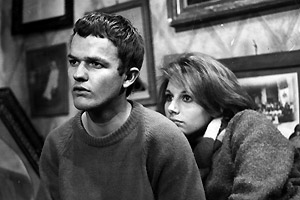
It's a nearly impossible film to classify. What begins as a troubling portrait of a dysfunctional family crippled by a host of unfortunate illnesses morphs into, at various times, a bittersweet coming-of-age saga, a satirical look at middle-class Catholic values and a gothic horror film. The film shocked Italian audiences in the 60's upon its initial release, probably as much for its sour, nihilistic tone as any actual content, and at times it resembles the Luis Bunuel films that outraged a previous generation of Europeans. Bellocchio seems to share with Bunuel a disgust with the complacent social mores of his countrymen, and similarly reacts with surreal visions of selfishness and depravity, intended to provoke, confuse and outrage the viewer.
During the opening passages of the film, Alessandro (Lou Castel) pontificates aloud, ad nauseum, about two topics: his love for his sister Giulia (Paola Pitagora) and his desire to kill his entire family. They are wealthy enough to live in a large villa just outside of town, but suffer from a variety of ailments and deformities that, along with an unseen but apparently troubled relationship to the townsfolk, have rendered them outcasts. So his lonely days are spent chatting idly with Giulia, caring for his blind mother (Liliana Gerace) and his slow-witted brother (Pier Luigi Troglio) and popping pills to avoid painful and dangerous epileptic fits.
The idea to kill everyone makes an odd kind of sense. His older brother Augusto (Marino Mase) fits in rather well to normal society, and would probably prosper if freed from the burden of such an odd bunch of misfits. If they all were to die, leaving Augusto with the inheritance money, he could live on as a real human being.
Though Alessandro remains death-obsessed throughout the film, Bellocchio's careful not to overplay his hand. The boy's unstable, dangerous even, but not a psychopath or a caricature. This is not Patrick Bateman gleefully taking a chainsaw to prostitutes, only in black and white. It's unclear whether our hero merely enjoys flirting with death (in much the same way as he flirts with incest), as a way of proving that he is truly alive, or whether he really intends to off everyone who cares about him.
And even in the film's more amusing passages (there are several scenes of dark comedy), the eerie score of Ennio Morricone and claustrophobic cinematography of Alberto Marrama keep things unsettling. This villa is not a pleasant place to live, and if remaining there with all these invalids wouldn't neccessarily turn you insane and homicidal, it might at least alter your perspective.
Of course, as this is an Italian film, Catholicism plays a role in Alessandro's encroaching madness. His desire to kill himself and his relatives for his brother's sake, obviously, has made him a Christ figure in his own mind, but there's also the sense of religion robbing him of some higher purpose. All he knows about the universe is God, and clearly God has rejected him and his family. So what else is there behind God? Why continue to live?
It's an unconventional kind of movie, and as I said, it can be confrontational at times. Certain shots are held too long, the music (terrific and creepy though it may be) occasionally overpowers the dialogue and performances. And, of course, because the protagonist is pretty much a crazy guy, he can occasionally be kind of shrill and annoying. Castel's spastic giggle, employed throughout the film, gets old fast. Perhaps this is because it's the work of a first-time director, but Bellocchio clearly didn't set out to make a pleasant diversion of a movie. It's a film designed to shock and unsettle, and it's still successful 40 years after it was first screened. Impressive.

Just saw this tonite. Rather unique, and for the most part rather excellent.
ReplyDeleteI wonder if the morbid and perverse depiction of the family didn't shock Italians in the 60's more than anything else. And as noted in the review, Alessandro is not stark-raving mad...which makes him more dangerous still.
Chilling, with (black) humorous touches in places. Unique, I think.
It is unique. A surrealist family drama/horror film/social satire. As I said, very difficult film to classify but a memorable on that sticks in your head for days afterwards.
ReplyDelete